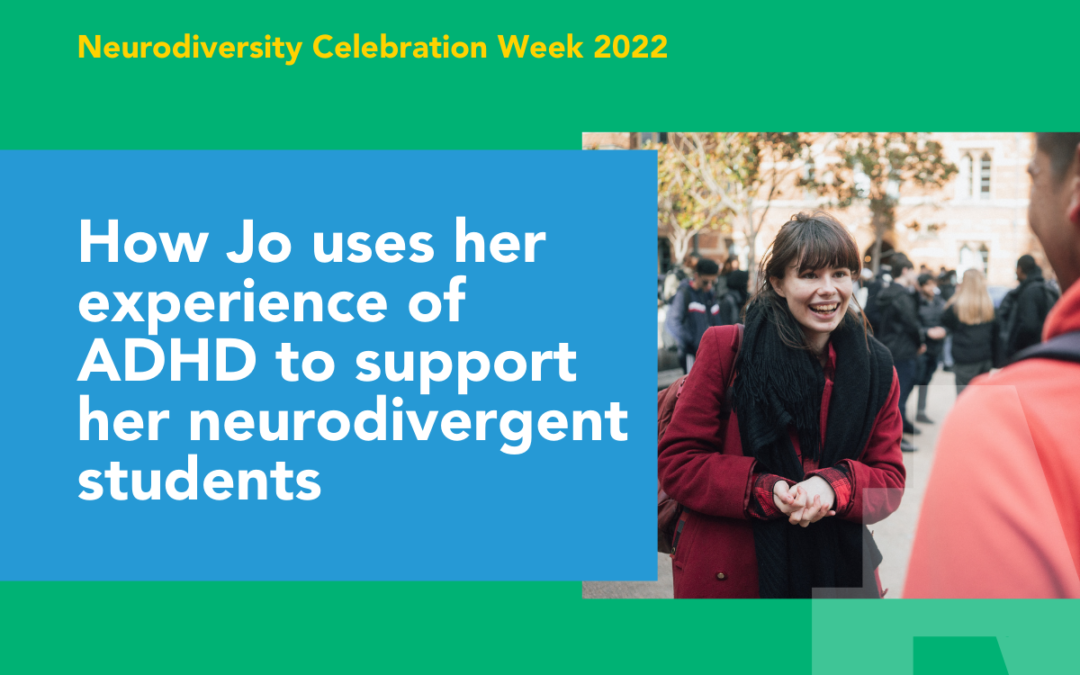Neurodiversity Celebration Week aims to help people learn more about neurodiversity and develop a more positive perception of the unique traits and skills of neurodivergent people.
Neurodiversity means that people experience and interact with the world in many different ways, and that there is no one “right” way of thinking, learning, and behaving.
To mark Neurodiversity Celebration Week, we spoke to our University Access Officer Jo about her experience of ADHD, and how it’s helped her provide better support to neurodivergent students on our programme.
What is your experience of ADHD? Can you give one example of how it affects you?
I have ‘combined type’ ADHD, which means I experience symptoms linked to inattention and hyperactivity-impulsivity. In experiencing these symptoms, ADHD has had an effect on my confidence at work and in my day to day life, as I struggle to stay organised or on track with tasks, and I often find it hard to relax or ‘switch off’ which can lead to burnout or sleep deprivation.
When were you diagnosed with ADHD? How did the diagnosis make you feel?
I was diagnosed with ADHD in mid-2021, after spending a few months on a waiting list. The standard NHS waiting time is about two years at the moment, but Psychiatry UK currently provides a Right to Choose referral service for NHS patients in recognition of the delayed waiting list. There has been a huge demand for ADHD diagnoses for adult patients since 2020, so I was really lucky that at the time the waiting list for Psychiatry UK was quite short!
Getting the diagnosis brought about mixed feelings: on the one hand I was relieved to finally be able to understand what I struggled with and why I found certain situations more difficult. On the other hand, it was frustrating as I wished I had known sooner or been able to advocate better for myself, and it made me aware of the fact that I needed to adapt how I worked in order to better look after myself.
How has your ADHD diagnosis affected your work?
There are areas of my job as a University Access Officer (UAO) which have been initially challenging as a result of my diagnosis. As a UAO I spend a lot of time organising and planning my provision, and without a structure that worked for me at first I found it difficult to understand how to do everything efficiently. However, through understanding how difficult I found this I have been able to work with others to put in place systems and processes that I can be accountable for and work for me. Building these systems up has allowed me to approach my work with much more confidence and means I have more time to deliver provision in an impactful manner.
My ADHD also uniquely helps me in my role as a UAO, as I work with students who may be neurodivergent themselves. Going through the process of diagnosis has allowed me to understand myself better and ultimately can help me provide the support these students need. After having a conversation with one of my students who wanted to access additional support for a disability at university, I was able to use my experience of accessing Disabled Students’ Allowance to create a guide for this student and others. I understand how difficult an educational setting can be for neurodivergent students and I want to make sure that every student I work with has access to the support they need.
What can people do to communicate better with someone that has ADHD? Give us your top 3 tips.
Provide a space to talk through your emotions: it can be really difficult for people with ADHD to resolve issues if they don’t understand why someone is frustrated with them.This is because people with ADHD may have been dismissed or told they are incompetent for actions related to their ADHD which they may not know how to resolve. This can make people with ADHD more likely to experience rejection sensitive dysphoria (RSD) which leads them to experience overwhelming emotional responses to actual or perceived criticism or rejection. The more space provided to explain what issues are being experienced, the easier it is to communicate.
Communicate information clearly and succinctly. People with ADHD may find it much harder to process and absorb information as a result of struggling to focus, so in conversations it is useful to give space for someone to follow clear instructions and process information through asking and answering questions.
Value and adapt to different ways of communicating to play to the strengths of someone with ADHD. For example, impulsivity and hyperactivity may make it difficult for people with ADHD to organise their thoughts and stay on topic – but when they have space to share their thoughts and ideas they can be very responsive and engaged. Providing a structure through which to communicate questions or points of interest allows someone to come back to the topic while expressing their own interests and thoughts.
Mentoring support comes from a dedicated member of The Access Project staff who is based in the partner school and who works with the students on the programme. Our University Access Officer provides expert advice from Year 10 to build students’ knowledge and understanding of universities and courses, and provides one-to-one support and advice on applications and interviews.

